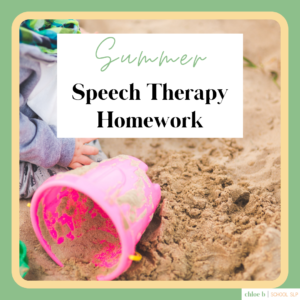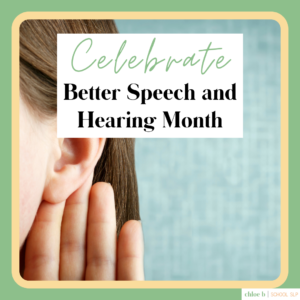There are lots of jobs out there in this big world. Some, like speech language pathologists, are rarely talked about and aren’t well known. Unless you know someone personally who is an SLP or have needed one in your life, then you probably aren’t familiar with the job title. We definitely don’t get any screen time in movies or TV shows. I am a school speech language pathologist here to tell you everything you need to know about who we are and what we do!
Who is an SLP?
A speech therapist / SLP / speech pathologist / etc. is someone who specializes in communication disorders. This includes:
- language disorders
- articulation or speech sound disorders
- pragmatic / social skills disorders
- swallowing disorders
- cognitive disorders
- voice disorders
- fluency disorders
- augmentative and alternative communication methods
We all have a master’s degree in speech language pathology and are licensed by our state. Most of us also have a certificate of clinical competence (CCC behind our name) as given by our governing board to show our competency in education and skills. If you want to learn more, I’ve got you covered with other blog posts! Check out this post on explaining speech language pathology and this post on a degree in communication sciences and disorders.
What Do SLPs Do?
In all of the areas previously mentioned, we evaluate the patient/client, write a diagnostic report, make a treatment plan, and implement said treatment plan in the form of speech language therapy. We also do billing and gobs and gobs of paperwork 🙂
But our speech therapy field is so broad that medical SLPs (like those working in a hospital or skilled nursing facility) have a very different day-to-day job compared to someone who works in early intervention in homes or a school based SLP.

What Does a School Speech Language Pathologist Do?
In my opinion – a lot! Those of us in the schools often have to juggle a lot more ‘extra’ than those working in a private clinic or other setting. We have extra paperwork, extra responsibilities (recess duty), extra requirements (SLP ‘teaching’ license), and….extra time off 🙂
School based speech therapists still evaluate, plan treatment, and provide therapy. We usually have to do our therapy sessions in groups due to high caseload numbers which is different from a private clinic setting. (If you’re a parent debating pros/cons of school therapy services vs. private clinic services – check out this blog post all about it)
We are also creators and implementers of IEPs (individualized education program). There is so much to learn about those! Get the basics here.
In a school setting, we’re part of a team that all works together to ensure the academic success of the student. We work closely with general education teachers, special education teachers, occupational therapists, physical therapists, counselors, school administrators, etc. It’s a team effort!

How Can A School Speech Language Pathologist Help Your Student?
We have a pretty broad scope! In the schools though, we’re typically working on articulation (how sounds are pronounced), language (what you can understand and express), fluency (stuttering), social skills, and phonological awareness (foundation for literacy skills). We definitely also do voice, swallowing, AAC, etc. but it’s not as common unless we are choosing to specialize in it.
We work with all ages. You can see a school based SLP if you are 3-5 depending on how your state handles that care. (It’s free though so look into it!) Children in preschool, elementary, middle, and high school can all receive services by speech therapists – typically it’s onsite during school hours. And again, it’s free!
Unless your child is just getting a little services through the Response to Intervention program at schools, your child will likely have to be formally evaluated and given an IEP before they can start speech therapy. Some students are able to get their needs met within a few months/years and graduate from speech quickly! Others may need more time or need support throughout the duration of their academic career. No matter what, as a parent/guardian you have a powerful voice that you can (and should!) use to advocate for the needs of your child!
As always, if you have any questions or comments – drop them below or my DMs on Instagram, Facebook, or Pinterest!
-Chloe B | School SLP






3 Responses